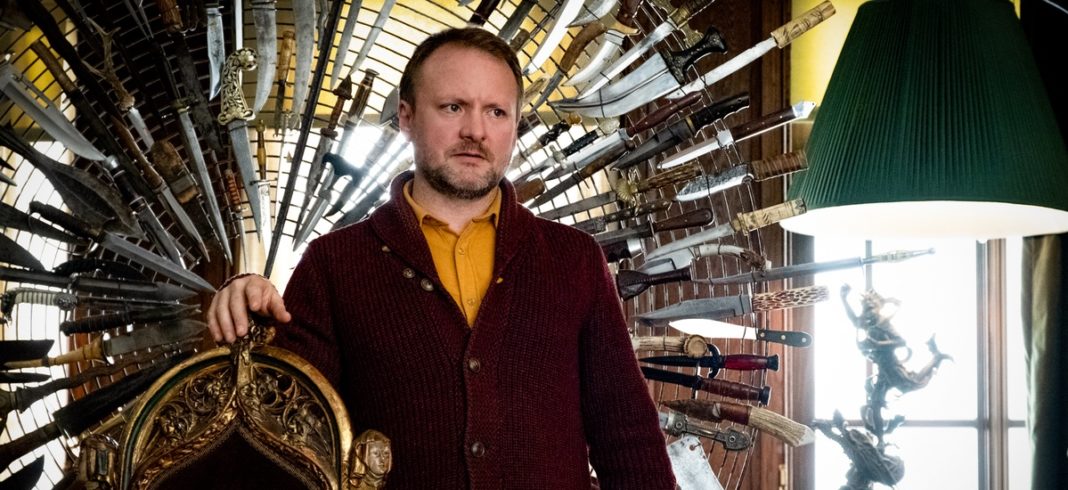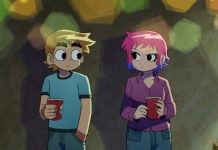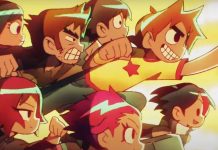Some might wonder what a director might get up to after directing a Star Wars movie.
Irvin Kershner only made a couple more movies after Empire Strikes Back. Return of the Jedi director Richard Marquand also made a couple more movies after the 1983 installment before dying in 1987. J.J. Abrams is still in the thick of it, and for George Lucas, well, who knows what he’s up to these days?
For Star Wars: The Last Jedi director Rian Johnson, it meant going back to the quirkier highly-original ideas he epitomized in earlier films like the sci-fi thriller Looper, the indie noir Brick and The Brothers Bloom, but this time with more money and a lot more street cred. (Granted, it didn’t hurt that Johnson was also directing shows like Breaking Bad in between those films.)
Knives Out is a comedy whodunnit with a cast that most directors would kill to get on screen together, beginning with Daniel Craig and Chris Evans, but also including meaty roles for Jamie Lee Curtis, Michael Shannon, Don Johnson, Toni Collette, Katherine Langford, Christopher Plummer and the amazing Cuban-born Ana de Armas, who went from this to being in next year’s James Bond film, No Time to Die.
The plot centers around legendary mystery writer Harlan Thrombey (played by Plummer) who has been found dead shortly after his 85th birthday party with most of his dysfunctional family in attendance. At first, it’s deemed a suicide, but everybody – other than his beloved nurse (de Armas) – has a good reason for wanting Harlan dead. It’s up to gentleman detective Benoit Blanc (Craig) to sort out which of the crazy relatives may have been responsible for Harlan’s death and why. It might be a simple whodunnit premise, but it’s the entertaining way that Johnson puts that genre on its edge that makes Knives Outso infinitely entertaining.
The Beat sat down with Johnson while he was in New York for the press tour that started way back in September when Knives Out premiered at the Toronto International Film Festival.
THE BEAT: I remember when we spoke for Brothers Bloom, however many years ago that was, and you were already developing Looper. Was Knives Out similarly something you’d been wanting to do for some time?
Rian Johnson: I’ve wanted to do it forever, but I had the idea for this about 10 years ago. I remember telling Joe (i.e. Joseph Gordon-Levitt) about the idea on the set of Looper actually, the basic idea meaning just a whodunnit that turns into a Hitchcock thriller that turns back into a who done it. You know, that was kind of the extent of the initial idea. But yeah, I’ve been chewing on it for the past 10 years and you know, I only sat down to write it last January. So it happened really fast when I sat down to write. But yeah, I’ve had this idea for a long time.
THE BEAT: Was it always going to be a comedy?
Johnson: First and foremost, I was thinking of it just as a whodunnit. I was thinking in terms of actually just making the mystery work and making the movie work as a thrill ride. Over the years I started thinking tonally about the Peter Ustinov Poirot movies, so Death on the Nile, Evil Under the Sun – those movies, which are the ones I was watching with my family when I was a kid. They seemed like the most fun type of movie that existed. They have these all-star casts, and they’re like these big events, but they walked that razor’s edge where they have kind of a cheeky, self-aware sense of humor, but they’re not Clue or Murder by Death. They’re not parodies – they never “tip over” – so that was kind of the sweet spot that I was aiming for with this one.
THE BEAT: Most people know Clue. They know the parody over the original movies it is parodying.
Johnson: Well, that’s the case with a lot of genres I think. Film noir people probably know the film noir parodies more through parody more than through the original stuff, I think. It’s funny how that happens. I mean, Weird Al was like one of the first bands I got into in junior high, and so a lot of musical genres and bands I experienced first listening to Al’s parodies of them. It’s a weird phenomenon.
THE BEAT: Was Hitchcock’s Dial M for Murder an influence at all? I saw it again a few weeks back, and that also has a mystery writer as a prominent part of the story, for instance.
Johnson: I’ve got to rewatch that; I’d forgotten that element of it. Hitchcock in general was. His approach to storytelling, his approach to suspense as opposed to surprise was what the whole narrative gambit of this is sort of based on. The Vertigo thing of instead of saying to the audience, “Can you guess what this mystery is all about?” saying, “Here’s the situation. Here’s this person who’s in danger. Can they get out of it?” I guess it’s 39 Steps or The Lady Vanishes. A lot of his movies. It’s his general approach to suspense.
THE BEAT: This is probably one of your more complex scripts, and that’s even with the time travel elements of Looper. Do you do the thing where you write scenes on file cards and then tape them to a wall somewhere?
Johnson: I do the opposite. I work in little notebooks. I work in just a smaller size mole-skin notebooks. For me, I work really structurally. I need to be able to basically on one page, draw a line and notch the entire plot on that one line all on one page. I need that. That’s when I know I’m ready to write, is when I can actually see the shape of the whole thing laid out on that little six-inch piece of paper. Ultimately, it needs to be that simple for me, especially something like this. The more complicated something is by its nature, the more simple you’re trying to make the experience for the audience. I always say I want this movie to be a roller coaster ride, not a crossword puzzle. That helps me, just having that kind of satellite map of the whole thing before I start.
THE BEAT: Do you have books literally filled with pages and pages of plot points that don’t connect?
Johnson: Completely… over and over again. I keep redoing it, and I write my notes and then I get bored, and I write song lyrics, and I write my notes again. Yeah, my notebooks look like the scribbled madness of a serial killer, but they all are leading towards getting that one distilled arc where I can see not just plot-wise but like really in terms of the audience’s experience as what I’m really trying to map. “Okay, here’s what’s pulling them through here and then everything turns around when they learn this and then this is what’s pulling them through here.” That that’s what the map is actually of.
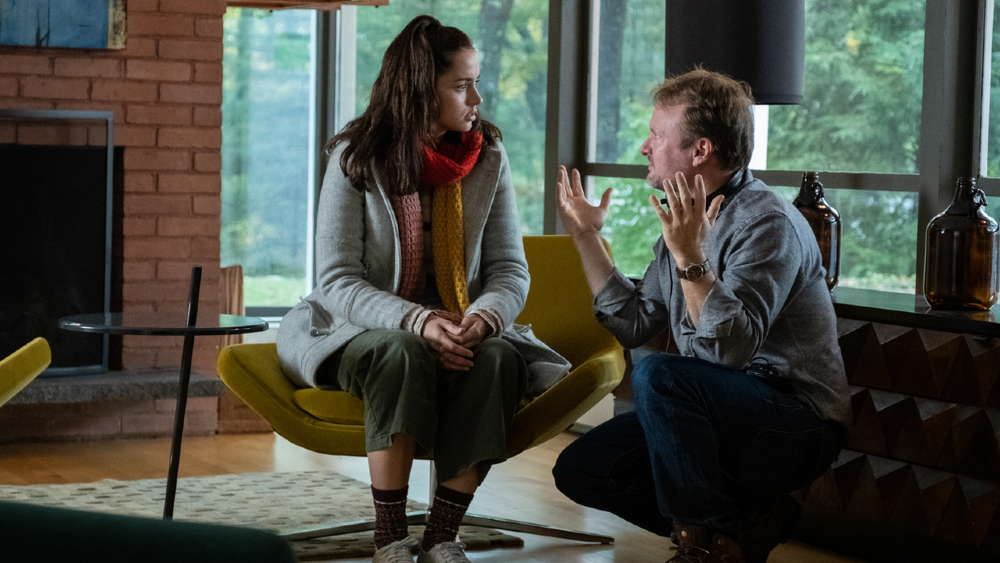
THE BEAT: What I find to be almost genius about this movie is that you literally show the audience what happened in the first hour, but you have all the characters telling different stories about what they remembered that night, and all their stories are different.
Johnson: They’re all putting themselves at the center of their own story. In that way, that’s something the murder mystery always has, and it’s something it has in common with the time travel genre, actually, is that it always exists on multiple timelines at once. You have the present-day investigation and then you have the secondary timeline of the night of. One thing that murder mysteries are always doing is dipping from the first down into the second from different perspectives. Obviously, the murder whodunnit kind of originated as a fiction on the page, but I think that element of it is something cinema is uniquely suited to. I feel like if we can effortlessly portray the same moment from multiple perspectives, which I’ve done. I did in Looper, I did a bit of it in The Last Jedi, too. It’s something that I really enjoy doing, is using it to explore human storytelling and how we perceive things different ways.
THE BEAT: Let’s talk about Ana, since she plays such a pivotal part to this story, and she’s really the heart of the movie, yet she’s not as well-known as most of the rest of the cast. How’d you end up with her? I’ve seen her in other things like Eli Roth’s movie and Todd Phillips War Dogs, and she was great in both.
Johnson: She’s incredible, man. I had seen her in Blade Runner, Denis Villeneuve’s movie, and I knew she was really good, but it was really my casting director, Mary Verniue, who brought her to my attention and said, “This actor is really something special. You have to take a look at her.” Mary had been in rooms where Ana had been auditioning for other things and had just seen what she brought and had seen her in person, that was the key. I think Ana was off shooting someplace, and I Skyped with her and had a good Skype meeting. It wasn’t until we got in the same room – she came to Boston to read for the part – and she did what ended up being the big scene with Christopher Plummer in the middle of the film. I was like, “Okay, I get it.” She’s got that Audrey Hepburn thing with her eyes where you see her, and you are just instantly on her side. That and her strength and spirit, that’s what the part really needed, you know? Yeah, she’s amazing.
THE BEAT: Was it a complete coincidence that she went on to do a James Bond movie or was Daniel Craig able to put in a good word for her?
Johnson: I think a few things happened at once. She had told me she had met with Barbara a few times before. She knew Carrie previously, but she and Daniel had a great experience on this and I’m sure that helped.
THE BEAT: They do have some great scenes together.
Johnson: Oh, they’re terrific. It’s interesting to me the dynamic between the detective and his Watson, especially in this, where we’re playing that for tension for a lot of the movie. The fact that Daniel in particular can – like all the actors in this – the fact that he goes as big as he does, but the character never feels like a joke. There still feels like there’s a genuine emotional connection between him and Anna. It’s interesting. It takes a really good actor.
THE BEAT: Christopher Plummer kind of does that. I’ve met him before, and he has that nature. He treats everyone as if he’s known them forever.
Johnson: Exactly. It’s comfortable… he’s a good actor, I guess. (laughs) I’d be funny if he’s a misanthrope, but no, he’s a lovely dude.
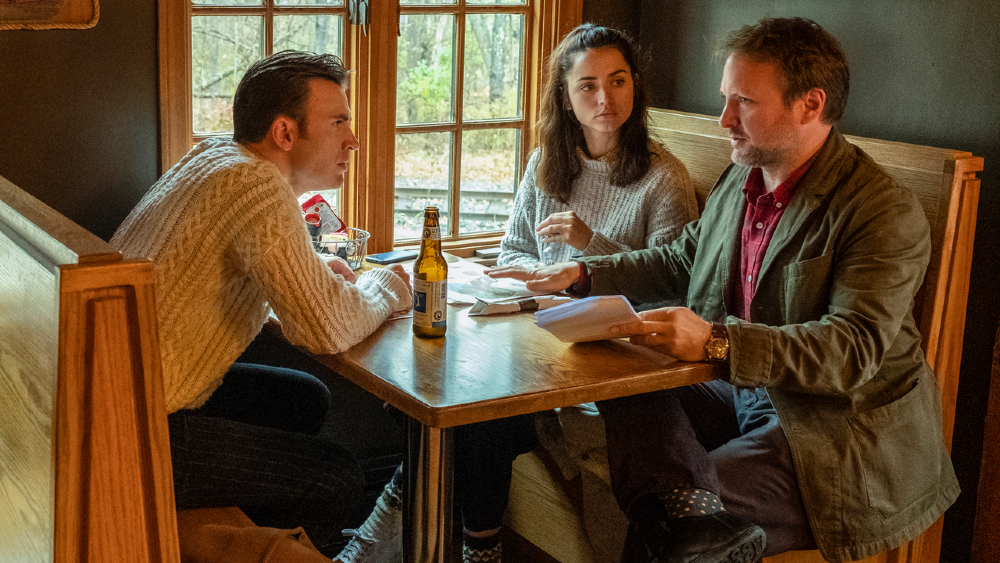
THE BEAT: You also save Chris Evans for the second half, which is pretty amazing to me. There’s all this going on, and then Evans shows up and throws a spanner into everything that’s been happening.
Johnson: Han Solo doesn’t show up until 45 minutes into Star Wars: A New Hope. It felt like a great idea that literally, he breezes in and brings this like breath into the movie. It’s also nice to give somebody a very long build up. It’s the same reason in the first scene with Daniel Craig, I hold off his entrance. He’s like lurking in the back, giving people a buildup so that when they finally step on the stage, you’re like, “Oh, now we get to meet this person.” It felt like something that could work.
THE BEAT: One of the biggest clichés I hear from so many filmmakers is the one about the location being a character.
Johnson: It’s like “New York is a character in the film.”
THE BEAT: “Even though we shot in Toronto.” That house where most of the movie takes place is absolutely amazing, the interiors, the exteriors… I’m not sure if they were the same house even…
Johnson: No, it was the same house. The upstairs stuff we did a build for, and the library was in a different mansion nearby, but all the stuff that’s in the living room and all the stuff downstairs, we actually shot indoor and outdoor with that house, which was amazing. When I was starting to show the script to people, the one question I was getting back was, “Is this going to feel like a really small movie?” Because it just seems [like it’s all] “interior room, interior room.” I just always had in my head, I was thinking of the 1970s version of Sleuthwith Laurence Olivier and Michael Caine. “If we can have that richness, you’re never visually bored when you’re watching that movie, even though it all takes place in one house.” David Crank, our production designer, I gave him that reference and he just filled this house up with all this insanity, so there’s a rich tapestry in that.
THE BEAT: Was that wall of knives meant as an homage to Game of Thrones?
Johnson: No, it’s funny. Not at all. I had written in the script this idea of a religious icon made in knives, just this weird visual idea, and then they made this thing and I thought, “Oh, that’s perfect,” and I got on set and lined up the first shot with the chair in front of it and I was like, “Oh, it’s Game of Thrones. Shit.” (laughs) That was a surprise, but I’m like, “Oh, all right. That’s an okay reference.”
THE BEAT: I didn’t get that until my second viewing, though.
Johnson: I guess they are kind of playing the “Game of Thrones” with each other, so that makes sense.
THE BEAT: I thought maybe it was an homage in that whoever’s sitting in front of that wall of daggers is in charge at that particular moment.
Johnson: No, that was an accident. You know what else is an accident? Partway through, one of the crew members came up to me and said, “I see what you’re doing with the knives.” I go “What?” He goes “The donut.” “That’s right. That was genius of me. I was thinking of that the whole time.”
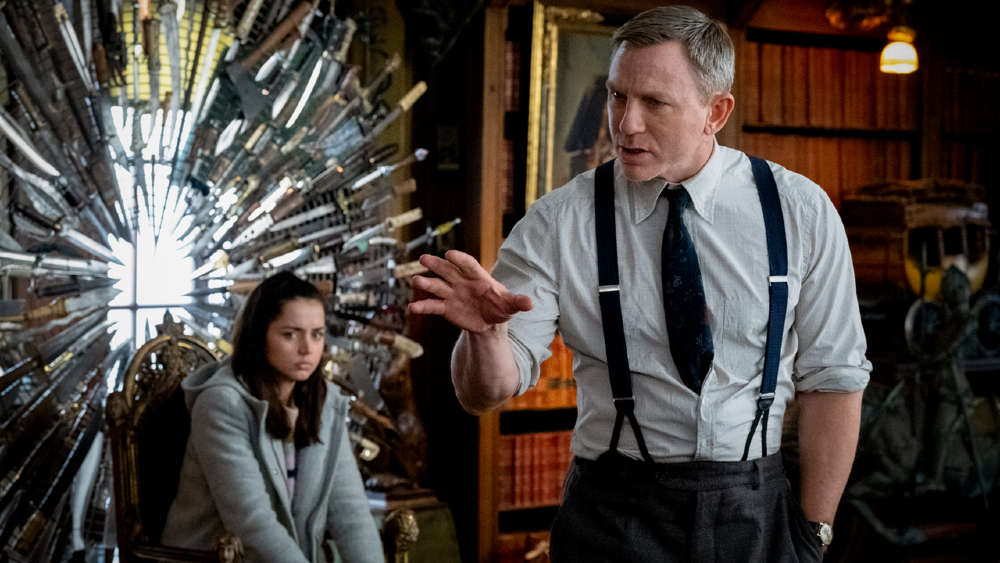
THE BEAT: I mentioned this before that you’re working with a lot of the same people that you worked with on your first movie Brick, although now you have a bigger budget. It’s amazing to me that this is almost the same crew but now you have a bigger budget. How much did that movie cost, like $3,000?
Johnson: Oh, no, it’s more than that. It was like $400,000.
THE BEAT: Still not a lot, but to work with many of the same people 14 years later is an achievement in itself. I wasn’t sure if some of them even do much when they’re not working with you.
Johnson: I mean, they’ve done some other stuff, but my composer, Nathan Johnson, is my cousin, and he’s kind of a polymath. He’s done a lot of stuff. He has a band that he plays with. He’s directed music videos himself. He is kind of a renaissance man a bit, and I feel lucky to get him to do film scores. This was his first orchestral score, which is really fun. After working with John Williams on Star Wars to be on the scoring stage with a full orchestra, but it’s me and Nathan up there. It was dizzying. It’s pretty fun.
THE BEAT: I’m glad you brought up Star Wars. Kathleen Kennedy was interviewed by Rolling Stone for its “Star Wars issue.” She was asked about your “controversial choices” for The Last Jedi, but she gave a very diplomatic answer. You seem to have had a good working experience there, as has J.J. Abrams, obviously, yet you have so many other directors who haven’t been able to make it work. What’s your secret to jumping into that world and then easily going back to do something like this?
Johnson: I can only speak to my experience there. Some of the other directors you’re talking about, they’re some of my favorite directors working today and and I’m now good friends with a lot of them. I can only speak to the experience I had, which was a totally lovely one, and it was collaborative with all the creative choices all the way through. It was with Kathy and with Disney and with the story group there, Lucasfilm, with JJ. We were all working on it together and all pushing it forward step by step and everything about it, it was kind of the best it could possibly go. It felt like a very personally fulfilling, beautiful creative experience from front to back. I can only speak to what my experience was.
THE BEAT: Do you think it’s easier to get a movie like this made after doing that?
Johnson: After making a Star Wars? I’m sure it doesn’t hurt. (laughs) This is not a small budget movie – this is like a medium-size budget movie, but compared to Star Wars, it’s a much smaller thing. Right now, I’m really interested still in making popular entertainments. Connecting with audiences on a big popular level is part of what still turns me on creatively. Seeing if you can do that in a way that’s truly interesting and entertaining for an audience with different layers going on and everything, that’s what seems exciting to me now. Which is all to say that it’s not like I’m trying to come off Star Warsand use my juice to get my completely weird movie that’s going to cost a lot made…
THE BEAT: But you really should do that, though. That’s part of the point of directing bigger franchise movies.
Johnson: To me, if I was going to do that, I would make it for like $1 million. You know what I mean? I feel like I do have just that sense of… I don’t know, maybe I’m too responsible in that way, as if maybe I should be a little more reckless. I don’t know. I feel like this movie, it could bear the budget, because I knew I wanted to make it as something that you could go with your whole family to see on Thanksgiving. That’s part of what was exciting about it to me.
Knives Out opens on Wednesday, November 27 with previews on Tuesday night.


